Oh, are you looking for a list of our upcoming events? We’ve got that, our Google Calendar is further down the page—you can jump to it with this link. But before you do, we’d like to share with you why we believe that calendars, especially the church calendar, is such an important aspect of our Christian heritage, and why it plays a central role in the yearly life of our church.
TODAY IS:
That is A.D. Anno Domini, the year of our Lord. Everyone in the modern world, from the athiest to the Buddhist to the Muslim to the agnostic to the polytheist, recognizes the life of Jesus of Nazareth every time they write a check, sign a contract or make an appointment.
Christians care about time, we care about history—we mark time so that we can redeem the time. The courses of the sun, moon and stars, the changing of the seasons, are not irrelevant to us. They aren’t just tedious aspects of creaturely existence. The faithful care about times and seasons, because it is through these things that God has revealed himself.
That’s why we set aside time for the very serious business of rejoicing and celebration. Our feasting is founded upon the fact that God became man, we respond to this by marking our time by the great events of his life. Calendars—chronologies and histories—have always been meaningful and significant to Christians, because it is the way we mark out God’s mighty acts on our behalf. For the pagan and the unbelieving there’s no broader scope or purpose or story being played out in time. There is no goal or end to history. But the faithful know that time has a goal and a purpose.
At Creation, God said, “Let there be lights in the firmament of the heavens to divide the day from the night; and let them be for signs and seasons, and for days and years;” (Gen 1:14). The word translated “seasons” is not only referencing summertime and wintertime. That same word is used 200 times throughout the Old Testament for festival seasons and special times for worship. In Leviticus 23 where God describes Israel’s festival seasons to them and the feasts they are to keep, the word “feasts” is the same word in Genesis 1 for “seasons.”
God set up the stars, sun and moon in their courses so His people know when to celebrate, and rejoice and give thanks. From the beginning God formed his creation to guide us in how to reflect upon His work of grace and redemption and the cycles of the year tell the story of the gospel.
Under the old covenant, in the Spring they celebrated Passover, with its theme of deliverance, just as the trees and plants and earth moved from death to life, so they would be reminded that God has brought them from death to life.
In the Summer they celebrated Pentecost. The summer is the season of growth and maturation and fruition, and so they were to celebrate the giving of the Law, by which they would grow by the Spirit.
In the fall was the feast of Tabernacles. Just as they were gathering the harvest in, and thanking God for His provision, so would they be pointed to that final spiritual harvest of all the nations, even as they sacrificed on behalf of all the nations.
In addition to these three seasons, they had the weekly Sabbath, and other feasts, harvest festivals, and celebrations they picked up along the way. Such as the holiday of Purim which celebrates God’s deliverance of His people which we read about in Esther. Later in the period between the Old and New Testaments, there was another deliverance during the time of the Maccabbees, and out of that came the celebration of Hannukah, which Jesus Himself celebrates in John 10. We might ask those Christians who don’t want to celebrate Christmas or Easter because they are “man-made” holidays if it was also wrong for Jesus to celebrate Hannukah.
Because Jesus has now fulfilled all the things that those old feasts pointed to – and because the Church has been designated as the New Humanity with and under Jesus, we take dominion over time with new festivals and feasts. We learn from the old covenant and we celebrate the fulfillment of those things. From very early in her history the Church established a new calendar based on the works of our Savior with the understanding that time has been redeemed by the work of Jesus who is now Lord over all.
Now we arrange our year around the life of Jesus. We begin our calendar with the great season of Advent which includes the cycle of Advent, Christmas and Epiphany. This season focuses both on the future coming and the first coming of Jesus, and all the ways He revealed himself to be the light of the world.
Then we come to the second great season of Easter which includes Lent, Holy Week, Easter and Ascension in the spring.
And then the third great season is the long season of Pentecost where the focus is on the maturation and growth of the church by the work of the Spirit and it includes the feast days of Pentecost, Trinity and All Saints Day.
The seasons play the story out for us, and they do this every year, they repeat their rhythms. Our lives and all of history goes through cycles, just like creation goes through cycles, and this is how God wants it to be, this is good, and this is how things get more glorious and better.
We were created to live our lives in harmony with the seasons, and the Church in her wisdom over the centuries has taken advantage of the seasons, to use them to number our days according to the life and work of Jesus.
Festivity is serious business.
Whether or not you celebrate the most important events in the history of the world is not a peripheral matter. God commanded his people to follow a certain calendar of feast days and celebrations and told them stop doing what they were doing and make time for festivity. In so many words He said, “These are my days. Be prepared to set aside your time and your money, because you are going to have a party when I tell you to have a party. I want you to buy meat and wine and bread and I want you to sing and laugh and dance and cut up. Eat the fat, drink the sweet.” All of this is still essential for God’s people. God’s people have always put a priority on marking out God’s mighty acts – the birth of Jesus, His resurrection, His sending of His Spirit.
Let’s be earnest and tenacious and unyielding when it comes to our feast days. Determine to enjoy them and enjoy all of them. Let us be dead serious about expressing our joy in the God who gave us life through his son Jesus through all the days and seasons and years he has given us.
Would you like to read more about the Church Calendar?
And now, here’s that event list you were looking for…

